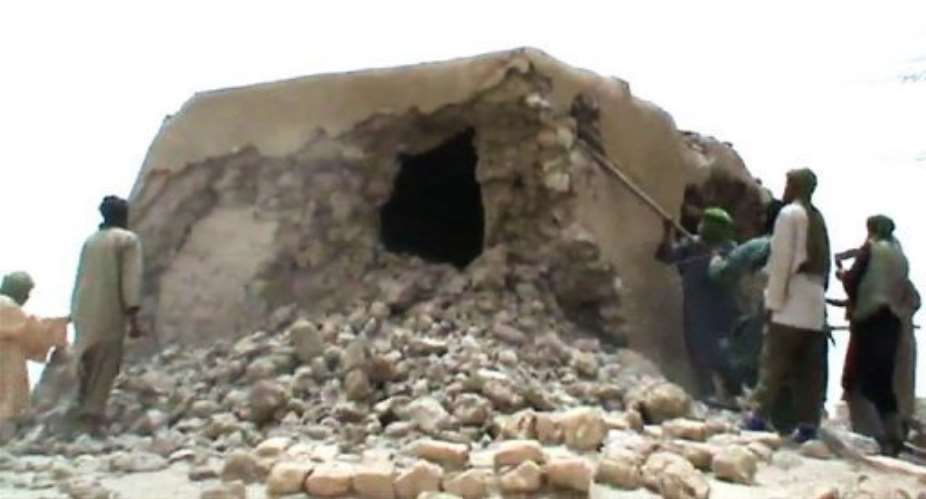BAMAKO (AFP) - The international community on Tuesday weighed options to help embattled Mali save its north from Islamist fighters who have smashed ancient shrines in Timbuktu and rigged another city with landmines.
As post-coup transition authorities in Bamako find themselves powerless in the face of the armed Al Qaeda-allied groups occupying the north, its neighbours seek a stronger unity government that could request African military intervention.
The Economic Community of West African States (ECOWAS) regional bloc says it has 3,300 troops ready to enter Mali, whose vast north has been occupied by armed rebels for three months after a March 22 coup plunged the nation into chaos.
French Foreign Minister Laurent Fabius told journalists in Paris his country was "confident" the United Nations Security Council would soon pass a resolution authorising the force to assist Mali win back its territory.
"This will allow our African friends to take a series of decisions, with international backing of course," Fabius said.
Guinean President Alpha Conde told AFP after meeting Fabius that only a government of national unity would have the legitimacy to request African military intervention.
"One cannot resolve the problem in the north if you don't first solve the problem in Bamako," he said.
The formation of such a government will be discussed by ECOWAS leaders and senior Malian political figures at a mini-summit in Burkina Faso's capital on Saturday.
Currently a 12-month interim government is in place in Bamako which took over from the junta who overthrew the former regime in March.
The coup had eased the way for Tuareg separatist rebels to seize an area in the north larger than France that they consider their homeland.
However, the previously unknown Islamist Ansar Dine (Defenders of Faith) fighting on their flanks swiftly took the upper hand.
They openly allied with Al-Qaeda in the Islamic Maghreb and pushed the Tuareg rebels from all positions of power.
In Timbuktu, where they have enforced sharia law for the past three months, Ansar Dine has in recent days smashed seven tombs of ancient Muslim saints as well as the 'sacred door' to a 15th century mosque.
The UN cultural agency UNESCO on Tuesday called for an end to the "repugnant acts" of destruction and called for the head of the body to create an emergency fund for the cultural treasures and send a mission to assess the damage.
The destruction has deeply upset Malians and prompted outpourings of condemnation from abroad.
And in the key northern city of Gao, Ansar Dine's Al-Qaeda allies have planted landmines around the city to prevent a counter-offensive by the Tuareg fighters they violently expelled last week.
Movement for Oneness and Jihad in West Africa (MUJAO) spokesman Abou Walid Sahraoui said the mines were also to prevent military intervention from other west African states.
"Yes, we have placed military devices which are defending the town against attacks. Our enemy is also all the countries who will send fighters here," he added.
The Tuareg National Movement for the Liberation of Azawad (MNLA) said Monday that MUJAO were preventing residents from leaving the city.
As the situation worsened in these northern cities, already suffering a humanitarian crisis as a result of the rebel occupation, Mali's interim government was scrambling for assistance to recover its territory.
"We will do everything to recover our territory," Foreign Minister Sadio Lamine Sow told AFP, speaking at the end of a two-day visit to Algeria, where he held talks with authorities in Algiers.
Sow condemned the armed groups now controlling the cities in northern Mali as "armed terrorists."
"It is they who are raping women, pillaging banks" and conducting a campaign of destruction, he said, saying these acts were crimes against humanity and would not go unpunished.
The International Criminal Court chief prosecutor Fatou Bensouda has warned that the destruction of religious and historical buildings could amount to a war crime and those responsible could face prosecution.





 We’ll no longer tolerate your empty, unwarranted attacks – TUC blasts Prof Adei
We’ll no longer tolerate your empty, unwarranted attacks – TUC blasts Prof Adei
 Bawumia donates GHc200,000 to support Madina fire victims
Bawumia donates GHc200,000 to support Madina fire victims
 IMF to disburse US$360million third tranche to Ghana without creditors MoU
IMF to disburse US$360million third tranche to Ghana without creditors MoU
 Truck owner share insights into train collision incident
Truck owner share insights into train collision incident
 Paramount chief of Bassare Traditional Area passes on
Paramount chief of Bassare Traditional Area passes on
 Two teachers in court over alleged illegal possession of BECE papers
Two teachers in court over alleged illegal possession of BECE papers
 Sunyani: Victim allegedly shot by traditional warriors appeals for justice
Sunyani: Victim allegedly shot by traditional warriors appeals for justice
 Mahama vows to scrap teacher licensure exams, review Free SHS policy
Mahama vows to scrap teacher licensure exams, review Free SHS policy
 Government will replace burnt Madina shops with a new three-story, 120-store fac...
Government will replace burnt Madina shops with a new three-story, 120-store fac...
